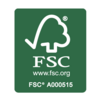
FSC - Responsible Forest Management
Standard Owners (1)
| Name | Country | |
|---|---|---|
| FOREST STEWARDSHIP COUNCIL FSC | 🇩🇪 Germany |
About (FSC - Responsible Forest Management)
The Forest Stewardship Council (FSC) is an international certification system that promotes responsible forest management. FSC certification ensures that forests are managed in an environmentally responsible, socially beneficial, and economically viable manner. Here are key aspects of FSC certification:
Environmental Standards: FSC certification requires compliance with strict environmental standards. Forest management practices must protect biodiversity, maintain the health and vitality of forest ecosystems, conserve water resources, and minimize the use of pesticides and chemicals. Forests certified under FSC must also undergo regular monitoring and assessment to ensure ongoing compliance with these standards.
Social and Indigenous Rights: FSC certification includes social criteria that ensure the rights and welfare of workers and local communities. It promotes respect for the rights of indigenous peoples and their participation in decision-making processes related to forest management. FSC certification also prohibits the use of forced labor and supports fair and equitable treatment of workers.
Economic Viability: FSC certification emphasizes the economic viability of forest management. Certified forests must be managed in a way that allows for the sustainable production of timber and non-timber forest products while maintaining the long-term health and productivity of the forest ecosystem. This includes practices such as responsible harvesting, reforestation, and the promotion of value-added processing and market access for certified products.
Chain of Custody: FSC certification extends beyond forest management to cover the entire supply chain. Chain of Custody certification ensures that FSC-certified products can be traced from the forest to the final consumer. This certification verifies that the products have been sourced from FSC-certified forests and have been handled and processed in accordance with FSC's strict standards.
Independent Certification: FSC certification is carried out by independent third-party certification bodies. These bodies assess forest management practices, conduct audits, and issue FSC certificates to qualifying forest owners and operators. The certification process involves on-site inspections, document reviews, and stakeholder consultations to ensure compliance with FSC's standards and principles.
Market Access and Labeling: FSC certification allows certified forest products to carry the FSC logo. This logo provides assurance to consumers that the product has been sourced from responsibly managed forests. By choosing products with the FSC label, consumers can support sustainable forest management practices and contribute to the conservation of forests worldwide.
FSC certification has gained widespread recognition and is considered a leading standard for responsible forest management. It helps promote sustainable forestry practices, protect biodiversity, support local communities, and provide market access for responsibly sourced forest products.